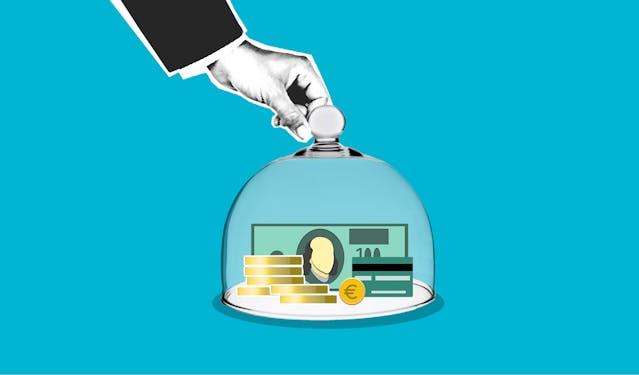
Savings and term deposits are two favored options for building wealth, but many people are conflicted about which is the better choice for their financial circumstances.
Regardless of your ability, the money you put aside should achieve maximum returns. Savings and term deposits can have comparable interest rates; however, you must be deemed eligible for the higher rates with savings. Term deposit rates coincide with the amount deposited and the term duration.
Differences Between Savings and Term Deposits
In today’s economic landscape, many people struggle to save money due to burgeoning debt and budget constraints, with credit cards often used to pay for day-to-day financial obligations.
While it’s not easy to put money aside in these situations, it’s not impossible. In fact, these are circumstances when it’s wise to accumulate a nest egg if there’s an emergency, for retirement, or to make a necessary purchase.
The two most popular choices for saving include traditional or high-yield savings or term deposits. How will you know which is suited for your financial needs and purposes? Aside from ensuring you get a high return; you should think about the following:
- Do you want to add to the account routinely
- How long do you plan to keep the funds in the account
- Do you have a large-purchase or retirement strategy with predetermined goals, including a monetary amount
- Do you prefer to lock in the interest rate or prefer that it fluctuate with the market
- Will you need access to the funds
Let’s examine the top distinctions between savings and term deposits to inform and educate, allowing for better decision-making.
Savings Access and Payout
There are distinct commitments required for each product and by financial institutions, such as Judo bank term deposit vs savings account . With savings, you must be disciplined in order to achieve your goals. The term deposit requires you to structure the investment and then let it work until its term comes.
-
Savings
Savings are distinct from term deposits in that when you apply for an account, you will have explicit freedoms and flexibility that term deposits do not. These include depositing funds to continue to add to your wealth, withdrawing as you wish, or closing and receiving a payout at any time.
You are afforded the benefit of how you save, when, and the amount. The longer you keep the funds in a savings account, the greater your returns will be. For those looking for accessibility and convenience, savings can be the ideal option for your situation.
The downside to consider is the temptation to spend as the money grows and being committed and disciplined enough to avoid that urge. Visit https://www.businessinsider.com/personal-finance/banking/how-to-open-high-yield-savings-account for guidance on opening high-yield savings.
-
Term deposits
When applying for a term deposit, you structure the investment, including the amount you’ll deposit and the term. This can be a:
- Long deposit: up to five years
- Short deposit: up to 12 months
Once the deposit is made, the funds are meant to be inaccessible. The wealth builds at a higher interest rate based on the amount deposited and the term length.
For short deposits, interest is paid when maturity is reached. Long deposits pay interest income either quarterly or annually. These are paid into an account of your choosing. Once the account reaches maturity, you’ll be offered a payout by the financial institution or the choice to reinvest the funds along with the interest earned.
Early withdrawals are discouraged but can be authorized by the bank; however, a penalty will likely be charged, and payout will be done at a lower interest rate.
The Interest Rate
Fixed interest has always been a preference among investors, and that’s true with savings. That would mean choosing term deposits, a fixed-interest product, over variable savings. Let’s look at the two options.
-
Savings
Savings accounts do not come with a guaranteed return on the funds you deposit. These grow at a standard variable rate, meaning the interest earned will be based on either the bank or other financial institution or the national rate.
The interest earned will be paid monthly; compound interest is earned if no funds have been withdrawn. This makes achieving goals easier as earned interest continues to be added to the account each month, and that new balance will then determine the following month’s earned interest.
The fact that you’re growing your wealth faster plus can make deposits at will makes savings an appealing option for putting money aside.
-
Term deposits
Term deposits are also a favored choice with home buyers, investors, and retirees because they earn some of the highest rates compared to most savings plans and are one of the safest options.
Term deposits are a lower risk than real estate or shares. The rate is guaranteed and fixed from the moment the funds are deposited, with no threat of fluctuations. You’ll receive the best interest rates based on higher deposits and longer terms.
The term deposit is an ideal method for setting aside a lump sum for an extended period for which you can anticipate the guaranteed gains. Click here to learn the fundamentals of term deposits.
Building Wealth
Some people will want to continue adding to their savings as funds become available, particularly if budget constraints make it difficult to deposit substantial amounts at once.
-
Savings
With savings or high-yield savings, you can add to your account at will and also borrow from the funds when obligations that require it arise.
-
Term deposits
You can’t add money to a term deposit account. The sum you put in will be the amount that accrues interest until the term matures. This interest also does not compound as it does with a savings account. However, you can create as many term deposit accounts as you’d like with any amount you choose.

These are low-maintenance, open-and-let-it-grow accounts; the funds will do all the work for you. They are relatively simple and straightforward.
Final Thought
While the economic landscape can present challenges in saving, there’s no better time to open an account. Savings or high-yield savings and term deposits offer ideal opportunities for you to thrive. It’s a matter of applying a few questions to see which applies better to your current situation.
















